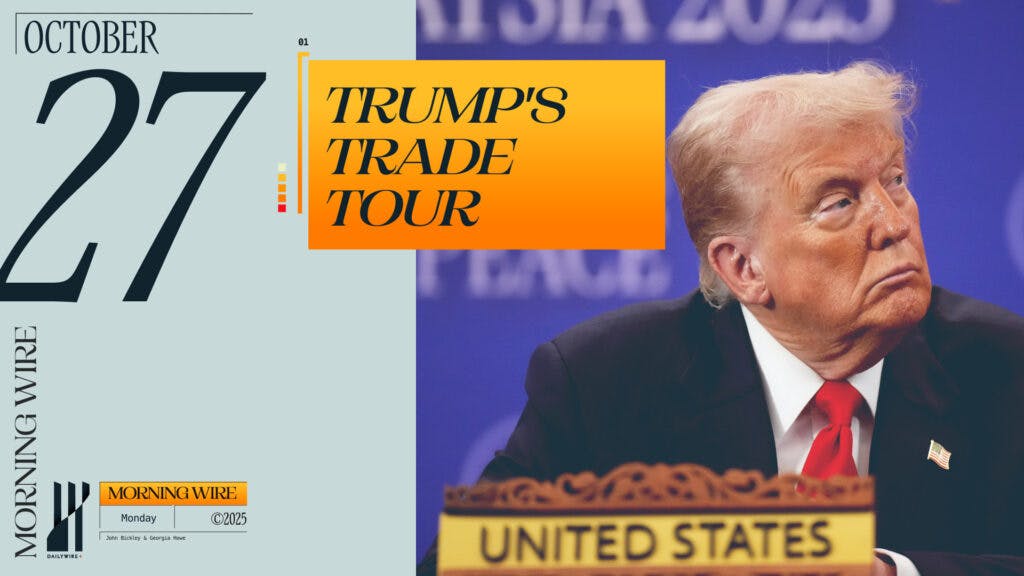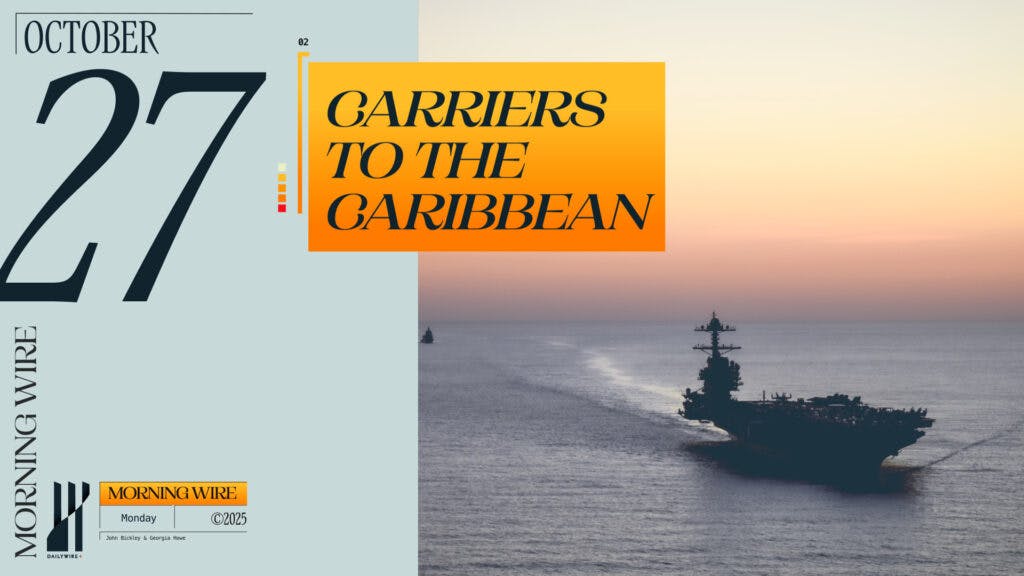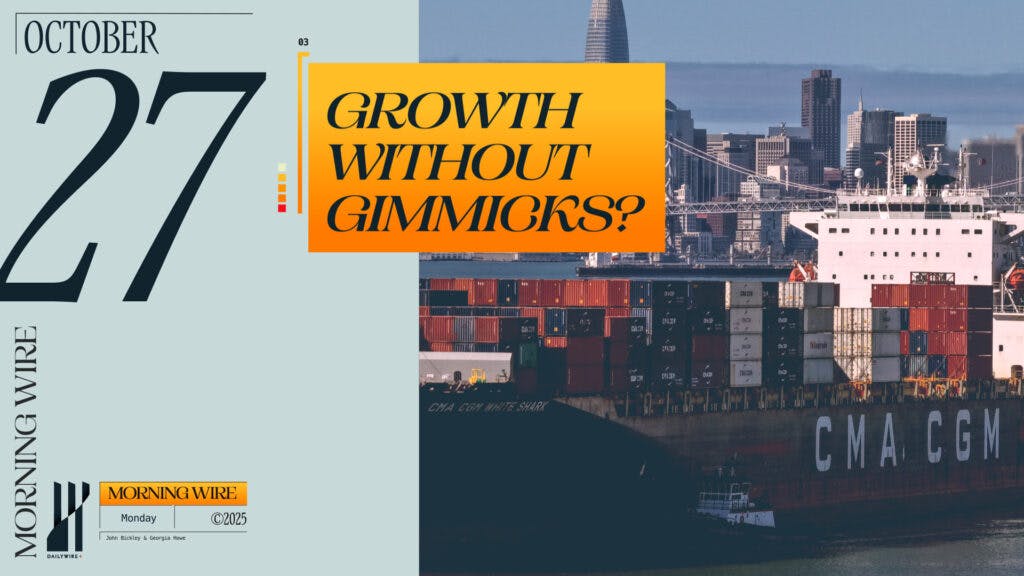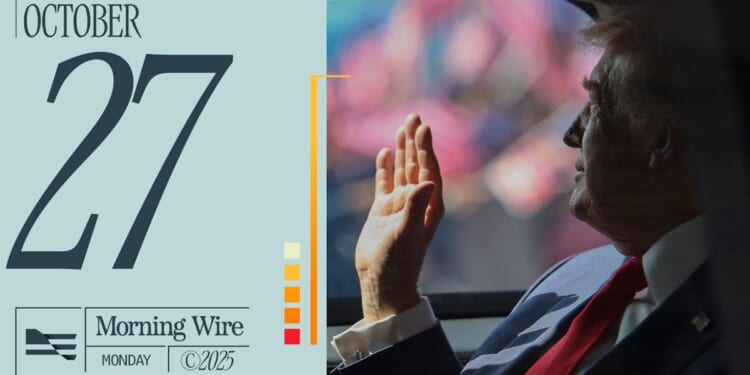President Trump brokers several monumental deals in Asia, the U.S. ramps up its military presence in the Caribbean, and we get an expert opinion on the state of the Trump economy.
It’s Monday, October 27, 2025, and this is the news you need to know to start your day. Today’s edition of the Morning Wire podcast can be heard below, and the video version can be seen on The Daily Wire:
Trump Strikes Trade Deals In Asia

Topline: President Trump landed in Asia on Sunday to kick off a whirlwind diplomatic tour aimed at securing new trade deals and peace treaties.
Trump arrived in Malaysia, the first stop on his tour of South Asia, which will also include visits to Japan and South Korea.
The main goal of the trip is to lock down more trade deals and open up access to Asian markets. Within hours of his arrival in Malaysia, the president announced new trade agreements with Thailand, Malaysia, and Cambodia. Each country will eliminate the vast majority of existing tariffs on U.S. imports, and the latter two will allow for unprecedented American investments in rare earth mineral production.
While this trip was focused on trade, the president also signed a ceasefire deal between Cambodia and Thailand, two longtime foes who were on the brink of war this summer after fighting broke out over a border dispute. Under this new agreement, the two sides will pull back military forces from the border and exchange POWs.
Join us now during our exclusive Deal of the Decade. Get everything for $7 a month. Not as fans. As fighters. Go to DailyWire.com/Subscribe to join now.
“I love doing it. I shouldn’t say it’s a hobby, because it’s so much more serious than a hobby — but it’s something that I’m good at and it’s something I love to do,” said Trump.
Meeting Xi: This trip will be defined by Trump’s sit-down with Chinese leader Xi Jinping. The two will meet face-to-face on Thursday for the first time since 2019. Ahead of that high-stakes showdown, Trump expressed optimism regarding a “comprehensive deal” that could end the tit-for-tat trade war that’s lasted all year and resulted in unprecedented tariff rates exceeding 100%.
Ahead of that sit-down, officials from both sides have been meeting virtually non-stop this week to hammer out the framework for a potential deal. Beijing says a “basic consensus” has been reached and that the two sides “engaged in candid, in-depth, and constructive exchanges.”
Trump’s Moves Against Drug Trade In South America

Topline: President Trump ordered the most advanced U.S. aircraft carrier group to the Caribbean last week as he floated the possibility of strikes against drug cartels on land. And the Trump administration placed sanctions on the president of Colombia as tensions continue to rise with the erstwhile U.S. ally.
Venezuela: President Trump moved the USS Gerald R Ford carrier group to join the forces already stationed in the Caribbean. The Ford carrier group is the largest in the U.S. military, so this is an aggressive signal from the president that he isn’t satisfied with a few drug boats blown up here and there.
South Carolina Senator Lindsey Graham appeared on CBS’ “Face The Nation” on Sunday and said he had spoken to President Trump about potential land strikes in South America.
“I think that’s a real possibility,” said Graham. “I think President Trump has made a decision that Maduro, the leader of Venezuela, is an indicted drug trafficker, that it’s time for him to go, that Venezuela and Colombia have been safe havens for narco-terrorists for too long.”
Venezuelan Dictator Nicolas Maduro said last week that there are 5,000 Russian-made anti-aircraft missiles stationed around the country to defend the airspace. He also said that “millions of men and women with rifles would march across the country” if the United States were to attack on Venezuelan soil.
Colombia: Treasury Secretary Scott Bessent announced sanctions on Colombian President Gustavo Petro and his family on Friday. Bessent said in a statement that Petro “has allowed drug cartels to flourish and refused to stop this activity.”
Colombian officials have pushed back, pointing to continued interdiction of cocaine — but the country’s coca fields have grown continuously since Petro took power in 2022. Trump’s moves against Colombia have received support from Republicans representing sizable communities of Colombian Americans.
“Colombia is once again the number one producer of coke in the world. Colombians don’t deserve that,” said Florida Rep. Maria Elvira Salazar. “President Trump has a responsibility to stop drugs coming into this country.”
E.J. Antoni On Inflation and Trump’s Trade Deals

Topline: The latest economic report shows inflation slightly cooler than experts predicted at 0.3% rather than the predicted 0.4%. The White House is touting the numbers as yet more proof that Trump’s economic plan is working.
Morning Wire spoke with economist E.J. Antoni of the Heritage Foundation. (The following transcript has been lightly edited for clarity.)
Morning Wire: First, big picture – we’re nine months into Trump’s second term. How is the economy doing?
Antoni: I’d say the best way to describe it is that it’s in the midst of a transition, right? For basically the last two years of the Biden administration, you had a labor market that was being propped up in a lot of ways by government hiring. That’s gone away. In fact, it’s been replaced with government firings. And the result of that is a drag on the overall jobs numbers, right? In the same way, when you look at something like the way we measure the economy through gross domestic product or GDP, you had government purchases which were accounting for a very large percentage of that. That’s all gone away. In fact, it’s been replaced by a reduction in those government purchases, which is a drag on the headline number. What I’m trying to get at here is, as the government re-privatizes, as the Treasury Secretary says, you will see what looks like sluggish growth – which I think we’re in right now – but in reality is actually a returning to health. It’s almost like the chemotherapy that makes you feel really lousy, but gets rid of your cancer.
Morning Wire: The inflation numbers were a little bit cooler than projected. How do you feel about the state of inflation right now?
Antoni: Pretty good, especially since the number one driver of inflation in that CPI report for the month of September was gasoline prices going up so much, except that increase has completely reversed in the first three weeks of October. Now, prices are actually slightly lower than they were in most markets. We should expect the next CPI report – if we can even get it, it’s unclear because the government shut down – but if we could get it, we would expect even cooler CPI numbers.
Morning Wire: Treasury data show the tariff collection has really surged in recent months. What is the net effect of Trump’s tariff plan thus far in the economy? Are they working as advertised?
Antoni: Well, I guess it depends on how we want to say as advertised, right? … But here are the facts. They’re bringing in way more revenue than anticipated to the Treasury. We can certainly have a debate over who is paying for those tariffs. But, the fact is they’re bringing in billions of dollars in revenue, in fact, hundreds of billions of dollars when you annualize it. That’s one of the reasons why September had the biggest surplus ever for the month of September in terms of the Treasury monthly statement. It was because not only have we seen a reduction in overall government spending, but an increase in revenues, overall revenues of course, because the economy’s growing, but also specifically from customs duties, which are from the increase in tariffs.
Morning Wire: Is the reshoring effect — like Stellantis moving some production to the U.S. — is that a real trend or just a few isolated incidents?
Antoni: It’s certainly a real trend, but it is being blunted to a certain extent right now. You are seeing help to the manufacturing sector, and that some of it is being re-shored. But you’re also seeing, at least in the short term, some pain inflicted on manufacturing because, again, some of the things being tariffed are actually inputs. You’re making it more expensive, let’s say, for a car manufacturer to buy steel from abroad for the time being. Now, once that steel gets re-shored back to the United States and you can buy it domestically, then it’s a moot point, right? But at least for the time being, you’re having competing effects there where one is helping, the other is hurting.
Morning Wire: Final question, we’re about to wrap up the year with a couple months left here. What do you project to happen big-picture with the economy over the next few months?
Antoni: I think we’re going to continue to see some of these very positive trends with economic growth where, although the public sector, the government is shrinking, we’re going to continue to see growth in the productive private sector. And in particular, one of the reasons why I’m so optimistic here is that the growth we have seen thus far this year, which I think will continue, has been driven by increases in earnings, not simply increases in debt. … Their money is going further because earnings growth is outpacing inflation. That’s a very positive development.















